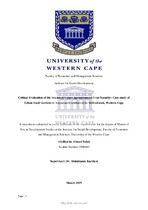| dc.description.abstract | This research investigates the impact of urban agriculture on food security through urban food garden projects in Kayamandi. Food insecurity is a major global challenge, 795 million people in the world suffer from hunger and malnutrition and 780 million of these are from developing countries. In South Africa, poverty, unemployment, and inequality play pivotal roles in the dynamics of food security. These indicators have shown that chronic poverty and food insecurity are mostly found in urban and peri-urban areas, affecting the most vulnerable groups such as women, children, and the elderly. In addition, food insecurity exists in Cape Town. In 2008, 80% of poor households in Khayelitsha, Philippi and Ocean View were either moderately or severely food insecure. Similarly, in Manenberg, a study revealed that 64% of the households were food insecure. Only 18% of poor households were food secure compared to the 74% and 94% for middle and high income households. Although there is numerous research on food insecurity in Cape Town, the contribution of urban agriculture to household food security in Kayamandi has not been addressed adequately. This study assessed the current state of food security in the Kayamandi settlement. The study also identified the impact of urban agriculture on food security in Kayamandi, as well as investigating the outcomes of an urban agriculture project in Kayamandi provided by the NGO, Love2Give. Qualitative research method was used to deeply understand the extent in which urban agriculture contributes to food security. In this process, 12 participants were purposively selected from the urban gardeners of the Love2Give organization including 2 key informant interviews. The Sustainable Livelihoods approach was applied to this study in order to understand the role Love2Give plays in building a sustainable community. As a theoretical framework, the Sustainable Livelihoods approach identified the mechanism Kayamandi gardeners use to secure their household food security. This is in alignment with the initial hypothesis, which is that Kayamandi households are food insecure. The majority of the participants in Kayamandi were either moderately (33.3%) or severely (33.3) food insecure whilst only four households were food secure (33.3). The high food insecurity in the area can be attributed to the high unemployment rate of 84% of the participants. Urban agriculture contributes to the household food security of participants. 75% of respondents engaged in urban farming for consumption purpose while the rest practice urban farming to generate income. Although participants generate little income from urban cultivating, it contributes significantly to their lives especially when they mix this with other livelihood diversification methods. Lack of water, land and enough farm equipment hinders the potential impact of urban agriculture. Therefore, there is a great need of intervention from multi-stakeholders such as NGOs, government and municipal authorities to intervene and promote urban agriculture as a means to reduce poverty and food insecurity. | en_US |

